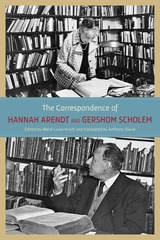
Arendt and Scholem met in 1932 in Berlin and quickly bonded over their mutual admiration for and friendship with Walter Benjamin. They began exchanging letters in 1939, and their lively correspondence continued until 1963, when Scholem’s vehement disagreement with Arendt’s Eichmann in Jerusalem led to a rupture that would last until Arendt’s death a dozen years later. The years of their friendship, however, yielded a remarkably rich bounty of letters: together, they try to come to terms with being both German and Jewish, the place and legacy of Germany before and after the Holocaust, the question of what it means to be Jewish in a post-Holocaust world, and more. Walter Benjamin is a constant presence, as his life and tragic death are emblematic of the very questions that preoccupied the pair. Like any collection of letters, however, the book also has its share of lighter moments: accounts of travels, gossipy dinner parties, and the quotidian details that make up life even in the shadow of war and loss.
In a world that continues to struggle with questions of nationalism, identity, and difference, Arendt and Scholem remain crucial thinkers. This volume offers us a way to see them, and the development of their thought, anew.
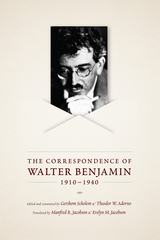

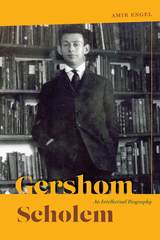
As Engel shows, in his search for the truth of Jewish mysticism Scholem molded the vast literature of Jewish mystical lore into a rich assortment of stories that unveiled new truths about the modern condition. Positioning Scholem’s work and life within early twentieth-century Germany, Palestine, and later the state of Israel, Engel intertwines Scholem’s biography with his historiographical work, which stretches back to the Spanish expulsion of Jews in 1492, through the lives of Rabbi Isaac Luria and Sabbatai Zevi, and up to Hasidism and the dawn of the Zionist movement. Through parallel narratives, Engel touches on a wide array of important topics including immigration, exile, Zionism, World War One, and the creation of the state of Israel, ultimately telling the story of the realizations—and failures—of a dream for a modern Jewish existence.
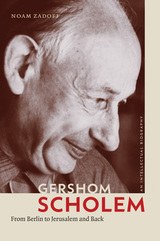
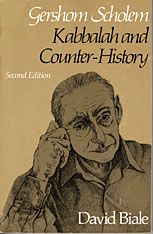
Through a lifetime of passionate scholarship, Gershom Scholem (1897–1982) uncovered the “domains of tradition hidden under the debris of centuries” and made the history of Jewish mysticism and messianism comprehensible and relevant to current Jewish thought.
In this paperback edition of his definitive book on Scholem’s work, David Biale has shortened and rearranged his study for the benefit of the general reader and the student. A new introduction and new passages in the main text highlight the pluralistic character of Jewish theology as seen by Scholem, the place of the Kabbalah in debates over Zionism versus assimilation, and the interpretation of Kafka as a Jewish writer.

For decades, Gershom Scholem kept these diaries locked away, returning to them only to refresh his memory of past events and eloquent observations. They remained unread by others until the meticulously edited German edition of this book appeared in 2002.
Lamentations of Youth gives insight into a crucial stage in Scholem's life, beginning when he was a student in Berlin during the First World War, a time of incubation and growth for his later ideas. Much of the journal writing, however, took place in Switzerland, a magnet for radical artists, socialist intellectuals, and revolutionaries fleeing war. The diaries are where Scholem forges his anarchic orthodoxy, and where he chronicles his intense relationship with Walter Benjamin. Many entries have the crisp quality of literary aphorisms crafted in the great German tradition of Kafka and Canetti.
For Scholem and Benjamin, the time they spent together in Switzerland spawned an astoundingly original view of literary criticism, interpretation, and cultural transmission. More personally, the themes of friendship, love, and heartbreak that dominate these pages later reemerge in Scholem's scholarship. No longer is the inner life of the critic seen as distinct from his textual criticism--they are deeply and esoterically intertwined.

Perhaps the greatest scholar of Jewish mysticism in the twentieth century, Gershom Scholem (1897–1982) once said of himself, “I have no biography, only a bibliography.” Yet, in thousands of letters written over his lifetime, his biography does unfold, inscribing a life that epitomized the intellectual ferment and political drama of an era. This selection of the best and most representative letters—drawn from the 3000 page German edition—gives readers an intimate view of this remarkable man, from his troubled family life in Germany to his emergence as one of the leading lights of Israel during its founding and formative years.
In the letters, we witness the travails and vicissitudes of the Scholem family, a drama in which Gershom is banished by his father for his anti-kaiser Zionist sentiments; his antiwar, socialist brother is hounded and murdered; and his mother and remaining brothers are forced to emigrate. We see Scholem’s friendships with some of the most intriguing intellectuals of the twentieth century—such as Hannah Arendt, Walter Benjamin, and Theodor Adorno—blossom and, on occasion, wither. And we learn firsthand about his Zionist commitment and his scholarly career, from his move to Palestine in the 1920s to his work as Professor of Jewish Mysticism at the Hebrew University. Over the course of seven decades that comprised the most significant events of the twentieth century, these letters reveal how Scholem’s scholarship is informed by the experiences he so eloquently described.
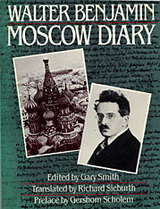
The life of the German-Jewish literary critic and philosopher Walter Benjamin (1892–1940) is a veritable allegory of the life of letters in the twentieth century. Benjamin’s intellectual odyssey culminated in his death by suicide on the Franco–Spanish border, pursued by the Nazis, but long before he had traveled to the Soviet Union. His stunning account of that journey is unique among Benjamin’s writings for the frank, merciless way he struggles with his motives and conscience.
Perhaps the primary reason for his trip was his affection for Asja Lācis, a Latvian Bolshevik whom he had first met in Capri in 1924 and who would remain an important intellectual and erotic influence on him throughout the twenties and thirties. Asja Lācis resided in Moscow, eking out a living as a journalist, and Benjamin’s diary is, on one level, the account of his masochistic love affair with this elusive—and rather unsympathetic—object of desire. On another level, it is the story of a failed romance with the Russian Revolution; for Benjamin had journeyed to Russia not only to inform himself firsthand about Soviet society, but also to arrive at an eventual decision about joining the Communist Party. Benjamin’s diary paints the dilemma of a writer seduced by the promises of the Revolution yet unwilling to blinker himself to its human and institutional failings.
Moscow Diary is more than a record of ideological ambivalence; its literary value is considerable. Benjamin is one of the great twentieth-century physiognomists of the city, and his portrait of hibernal Moscow stands beside his brilliant evocations of Berlin, Naples, Marseilles, and Paris. Students of this particularly interesting period will find Benjamin’s eyewitness account of Moscow extraordinarily illuminating.

In four elegant chapters, Robert Alter explains the prismlike radiance created by the association of three modern masters: Franz Kafka, Walter Benjamin, and Gershom Scholem. The volume pinpoints the intersections of these divergent witnesses to the modern condition of doubt, the no-man’s-land between traditional religion and modern secular culture.
Scholem, the devoted Zionist and master historian of Jewish mysticism, and Benjamin, the Marxist cultural critic, dedicated much of their thought and correspondence to Kafka, the explorer in fiction of radical alienation. Kafka’s sense of spiritual complexities was an inspiration to both thinkers in their resistance to the murderous simplification of totalitarian ideology. In Necessary Angels, Alter uncovers a moment when the future of modernism is revealed in its preoccupation with the past. The angel of the title is first Kafka’s: on June 25, 1914, the writer recorded in his diary a dream vision of an angel that turned into the painted wooden figurehead of a ship. In 1940, at the end of his life, Walter Benjamin devoted the ninth of his Theses on the Philosophy of History to a meditation on an angel by the artist Paul Klee, first quoting a poem he had written on that painting. In Benjamin’s vision, the figure from Klee becomes an angel of history, sucked into the future by the storm of progress, his face looking back to Eden. Benjamin bequeathed the Klee oil painting to Scholem; it hung in the living room of Scholem’s home on Abarbanel Street in Jerusalem until 1989, when his widow placed it in the Israel Museum.
Alter’s focus on the epiphanic force of memory on these three great modernists shows with sometimes startling, sometimes prophetic clarity that a complete break with tradition is not essential to modernism. Necessary Angels itself continues the necessary discovery of the future in the past.
READERS
Browse our collection.
PUBLISHERS
See BiblioVault's publisher services.
STUDENT SERVICES
Files for college accessibility offices.
UChicago Accessibility Resources
home | accessibility | search | about | contact us
BiblioVault ® 2001 - 2024
The University of Chicago Press









